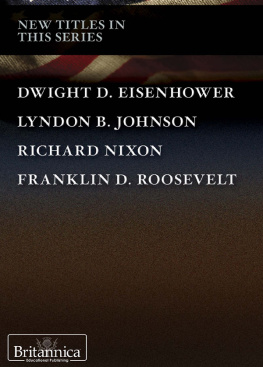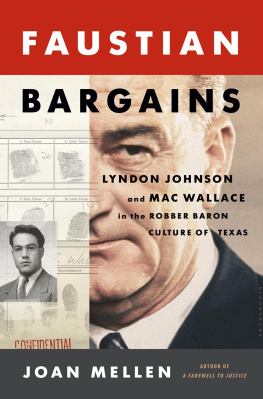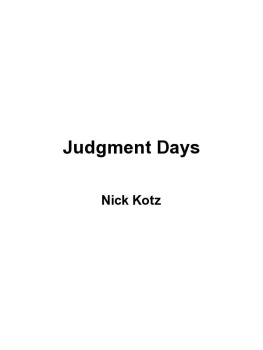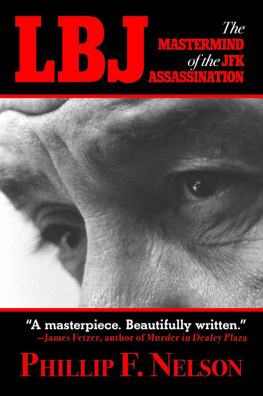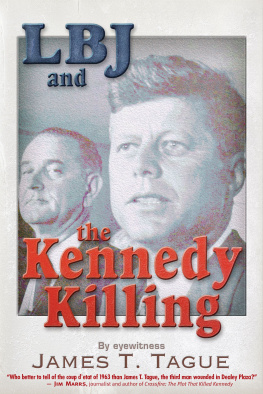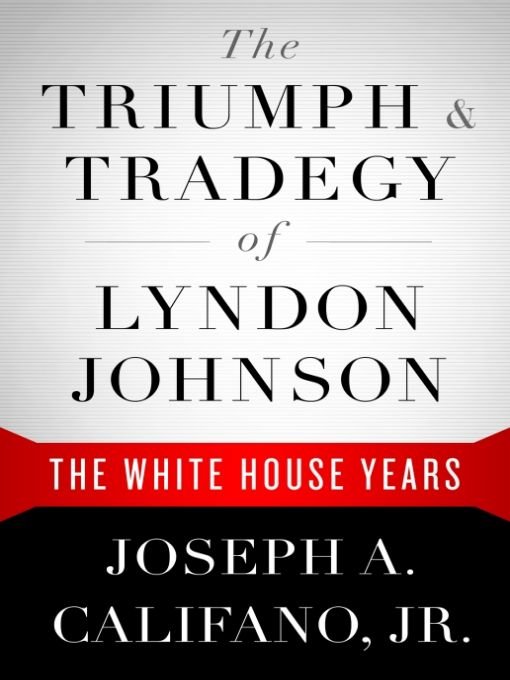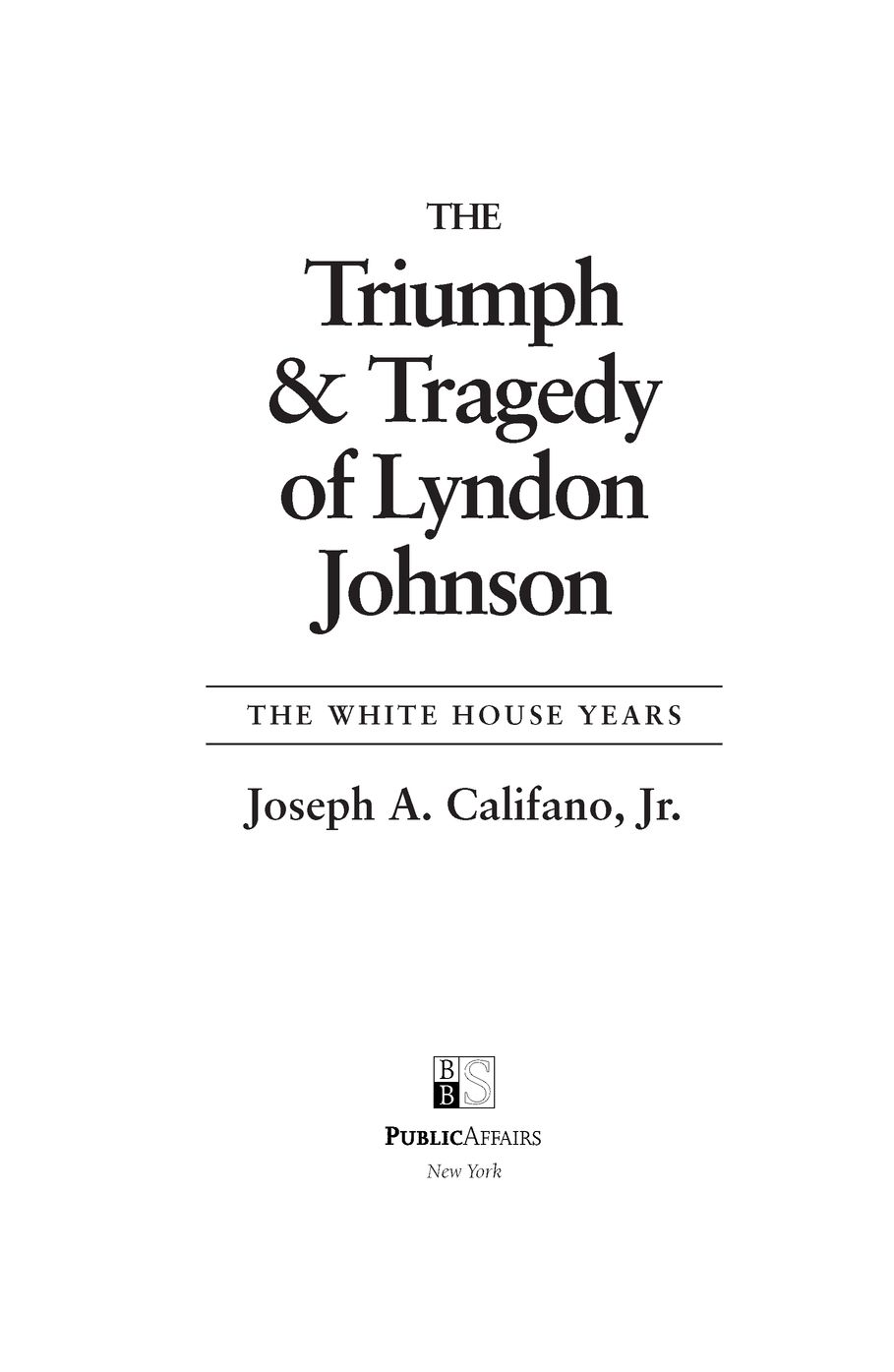Table of Contents
NUMBER EIGHT
The Joseph V Hughes, Jr., and Holly O. Hughes Series in the Presidency and Leadership Studies
James P. Pfiffner, General Editor
Series Editorial Board
Peri Arnold
H. W. Brands
George C. Edwards III
Fred I. Greenstein
Erwin C. Hargrove
Charles O. Jones
Martha Joynt Kumar
Roger Porter
Stephen J. Wayne
To MARK, Brooke, Joe III, Frick, and CLAUDIA
May your children give you the same
pride and joy you have given me
and
May each of you experience
the exhilaration and exhaustion
of spending yourself in a worthy cause
Prologue
IN JULY 1965, two months after my thirty-fourth birthday, Lyndon Baines Johnson appointed me to his White House staff.
For the next three and one-half years, I worked with him day and nightand he used every waking minute of his presidency. I ate more meals with him than with my own family and frequently saw him early in the morning in his bedroom and late at night as he fell asleep. He barked orders at me over the phone at dawn and after midnight, in the formal setting of the Oval Office and as he stood stark naked brushing his teeth in his bathroom. I watched him laugh, swear, get angry, cry, get hurt, hurt others, dream, and achieve things most everyone thought impossible.
I saw Lyndon Johnson inspire senators and powerful citizens to put their country ahead of their careers and their companies, drive men to distraction, work his aides and cabinet members to the limit and then demand and get more than they realized they had left. I watched him endure humiliation, and humiliate those he loved as well as those he hated.
He drew programs out of Congress that changed this nation irrevocably. He pursued equal rights and worked to redistribute wealth to bring millions of Americans out of poverty and provide opportunity for the disadvantaged. He could persuade legislative foes to support his programs and outmaneuver them when persuasion failed.
I saw him struggle to communicate with the American people and manipulate public opinion as the Vietnam War shackled his dreams and sapped his political firepower. In the end, I agonized with him as he came to doubt his ability to govern and recognized that he had to sacrifice himself and withdraw from the 1968 presidential race in order to heal the divisions he had come to symbolize.
The Lyndon Johnson I worked with was brave and brutal, compassionate and cruel, incredibly intelligent and infuriatingly insensitive, with a shrewd and uncanny instinct for the jugular of his allies and adversaries. He could be altruistic and petty, caring and crude, generous and petulant, bluntly honest and calculatingly deviousall within the same few minutes. He had a marvelous, if often crude, sense of humor. Once he made up his mind, his determination to succeed usually ran over or around whoever and whatever got in his way. He used his prodigious energywhich produced second, third, and fourth winds, as others, allies and adversaries alike, slumped in exhaustionto mount a social revolution and to control everyone and everything around him. He gave new meaning to the word Machiavellian, as he gave new hope to the disadvantaged.
This book is my take on Lyndon Johnsonfrom the day I went to work for him until January 20, 1969, the day we both left the White House. Too much of whats been said and written about LBJ is reminiscent of the three blind men, each touching a different part of the elephant: one mistaking the tail for a rope; another the trunk for a snake; the third a leg for a tree. My effort here is to give firsthand testimony on the man and President I saw, with the bark off, as he used to say when he wanted me to tell him something cold and true, with no punches pulled.
I was there as LBJ made the critical decision to step up the war in Vietnam in July of 1965. He entered as a reluctant warrior. He certainly thought he was doing what John Kennedy would have doneall Kennedys top advisers save one pressed him to escalate more and faster. At first he thought he could walk a line, avoiding all-out war and surrender, both of which he feared would dash his hopes for his domestic programs. But, once in, he wanted somehow to win on his terms. In the final months of his watch, he desperately sought to end the bloodshed, halting the bombing of North Vietnam in a futile gesture to achieve a cease-fire.
He was determined to go full speed ahead with his Great Society despite the escalating conflict in Vietnam. His ambition drove him to use all his cunning, and every bit of his stamina and intimate knowledge of Americas power elites to juggle the economy, the Great Society, and the war to promote his social revolution.
His commitment to racial justice and to eliminating poverty was genuine and consuming. It stemmed in part from a Texas youth in which he witnessed the effects of poverty and bigotry and in part from his southern populists political gut. Equal opportunity became, for him, a constitutional obligation, and he pursued it with messianic conviction. His quest for racial equality generated as much resistance as his policy in Vietnam. For both he risked his presidency, and I believe that his dark moments after he left office were spent less in self-pity than in self-examination, wondering what he could have done differently to get the American people to understand his conduct of the war and to achieve greater racial equality.
Lyndon Johnson saw himself in a desperate race against time as he fought to remedy the damage generations of prejudice had inflicted on black Americans. He was always in a hurry because he feared that, once black Americans sensed the prospect of a better life, their acceptance of discrimination would turn to impatience and dissatisfaction with progress however real, and they would subvert their own cause.
He was in a race against time with Congress and the affluent majority of Americans. LBJ knew that the sympathy generated by John Kennedys assassination and the huge margin of his own presidential victory in 1964 gave him a unique opportunity to change America, if he could move fast enough. He was always conscious that his days were numbered and that his political capital, however enormous as he began his presidency, was limited.
He felt entitled to every available lever, to help from every person, every branch of government, every business and labor leader. After all, as he often reminded us, he was the only President we had. He had no inhibitions in reaching out for advice, ideas, talent, power, support. He often saw traditions of separation of powers, or an independent press, or a profit-minded corporate executive, as obstacles, to be put aside in deference to the greater national interest as he defined it.
He wanted to control everything. His greatest outbursts of anger were triggered by people or situations that escaped his controlwhether it was the Senate Foreign Relations Committee on the Vietnam War, southern Democrats on a civil rights measure, a union leader holding out for an inflationary wage settlement, the North Vietnamese refusing to negotiate, his daughter Luci deciding to get married before her parents thought she was ready, some anonymous leak that made it harder to pass a bill, or not being able to find me because I had forgotten to leave a phone number at the White House.


